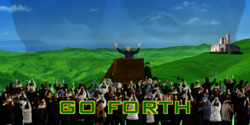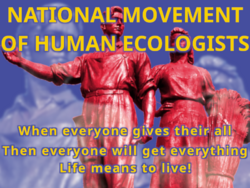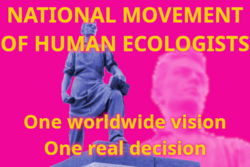National Movement of Human Ecologists
| National Movement of Human Ecologists | |
|---|---|
| Leader | Founder
National Coordinating Committee
|
| Founded | 1663 AN |
| Headquarters | Iago's Rest |
| Political ideology | Human Ecology |
| Political position | Left-wing |
| Colours | Green |





A political party formed in 1663 AN to popularize and campaign for the enactment of the ideas of Łudo Thalva. It lacks a defined party program, instead consisting of a thematically-organized catalog of Thalva's writings. Lord Łudo Thalva, the Viscount Thalva - a sitting member of the Landsraad, enjoyed the title of Party Leader until his death in 1723.
Contains elements of non-hierarchical spontaneous self-organisation as well as participation in a variety of prescribed "soul cleansing" activities. Its core ideology - commonly known but never officially described as Thalvaism - consists of a series of modest proposals that formed a values system known as "people-centred politics".
The Party newspaper is Lohmin.
Prior to the Kalirion Fracture the National Movement organised two subordinate parties, the Ecological Movement, Brookshire (EMB) and the Ecological Movement, Goldshire (EMG). As a consequence of the Fracture the EMG now finds itself operating in Elwynn and Ransenar, whilst the territorial collapse of the Imperial Republic has seen the borders of Shireroth now fall largely within the boundaries of historical Brookshire, negating the need to differentiate between national and regional parties.
Factions
Before the Kalirion Fracture, Łudo Thalva held absolute control of the political and ideological message. The disruptive nature of the fracture, however, has allowed for other voices to compete with his.
Valourism and Anti-Valourism: NMHE in Elwynn
The Human Ecological Movement entered Elwynn when it annexed the Sovereign Confederation in 1681 AN. By that time, it had mostly ceased to be an active participant in electoral politics.
The predominant interpretation of the Kalirion Fracture held by Human Ecologists in the Sovereign Confederation was that they were witnessing the End of The Machine, a minor theme in Thalva's writings that attempted to predict how the "machine-centered" society of today would be overtaken by a "people-centered" society of tomorrow. The work of Human Ecologists in the Sovereign Confederation therefore redirected away from participating in electoral politics as a means of disseminating their ideas towards establishing mutual aid societies to be the people-centered society that would preserve the people as the machine-centered society dissolved.
Contrary to expectations, the Elwynnese state was able to briefly reestablish stability throughout the region. Some in the Human Ecological Movement interpreted this as a sign that the End of the Machine was near, but that the machine-centered society had successfully prevented a systemic collapse. Instead, this task would need to be completed by the Human Ecologists themselves by accelerating the machine-centered society towards its own self-destruction. This nihilist branch of Human Ecology quickly radicalized, taking national stage in the Princely Elections of 1682, 1683, and 1685 in the person of Deirdre Valour.
In reaction to the emergence of "Valourism", an opposing faction in the Human Ecological Movement put forward Maaqa Kalirion-Alnavion in 1685. The Anti-Valourist faction attempted to bring about a return to the Movement's roots: using electoral politics as free publicity for their movement's ideology and political goals. Maaqa Kalirion-Alnavion denounced Deirdre Valour's politics as self-destructive and called for the reorganization of society into people-centered communes of harmonious labor and natural beauty. After both lost the princely election, Maaqa was successfully able to use her clout to gain a seat in the Council of Eliria in 1686 before defecting to Free Elwynn in 1692.
Thalvaism and Neo-Thalvaism: NMHE in Post-Fracture Shireroth
Łudo Thalva's pre-fracture teachings had focused on the self-defeating nature of the "machine-centered" society. In the Kalirion Fracture, many of his followers in Brookshire proclaimed the coming end and the dawn of the "people-centered" society, similar to that of his followers in Goldshire. What made Human Ecology evolve differently in Brookshire was the continued and active presence of Thalva himself. Instead of proclaiming a time of revolutionary struggle, Thalva instead advocated for a doubling down of his back-to-the-land movement. As the cities were seen as a key component of the machine-centered society that was breaking down, the only hope he saw was in encouraging a resettlement of the land by the urban population. Through the symbiosis of hand and earth, the machine-centered society would fall away and the people would achieve peace and harmony.
By 1674 AN, Thalva had unexpectedly accumulated enough political influence within Brookshire to find himself recuperated into the Imperial Republican order: he was invested with citizenship and placed on the Landsraad. Initially, he saw this as an opportunity to advocate at the highest level for his ideas, and preached that everyone within the shrunken Shirerithian realm should seek the justice of the land, for the land, and by the land. Over time, his involvement as an advisor to the Kaiseress (albeit, often disagreed with and ignored) revealed to him the ways in which the lingering powers of the state could be used to supplement the justice of the land.
Throughout the 1680s and 1690s, Thalva's writings began to take a turn now referred to as Neo-Thalvaism. Under this new phase of thinking, Human Ecology was increasingly not in cosmic battle against The Machine, but those who built and operated and maintained The Machine for their own ends, as they were the ones preventing the machine-centered society from giving way to the people-centered society. While he never joined the Association of Loyalists to the Throne and often butted heads with them, he just as often found himself and his party advocating in favor of the Kaiseress's anti-corruption efforts, and preached about the necessity for asceticism among the leaders of power and the need to do away with the moribund structure of fixed noble status that no longer reflected the reality of the lives of the people.
If Thalvaism could be described as the human and earthly struggle against the corruption of The Machine, then Neo-Thalvaism could be summarized as advocating for the construction a machine that combats machines in order that a "people-centered" society can flourish. When asked to clarify if he now saw a role for a state in his otherwise anarchistic philosophy, Thalva said "a good garden is in harmony with itself without the master direction of a gardener, but our garden is in need of a weeding".
Neo-Thalvaism became the favored branch of Human Ecology in Lohmin (PR. "Radiance"), the party newspaper for Guttuli. Beginning in 1720 AN Lohmin launched regional editions for Brookshire Modan, Sathrati, and Dalmacija. In early 1723 AN, as part of its preparations to compete in the upcoming general elections, the National Movement of Human Ecologists had a series of regional conventions, where the "Lohminists" successfully executed a purge of party officers who favored other branches of Human Ecology, replacing them with Neo-Thalvaists.